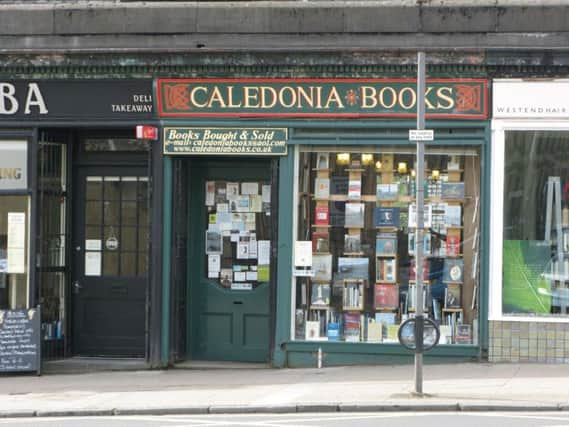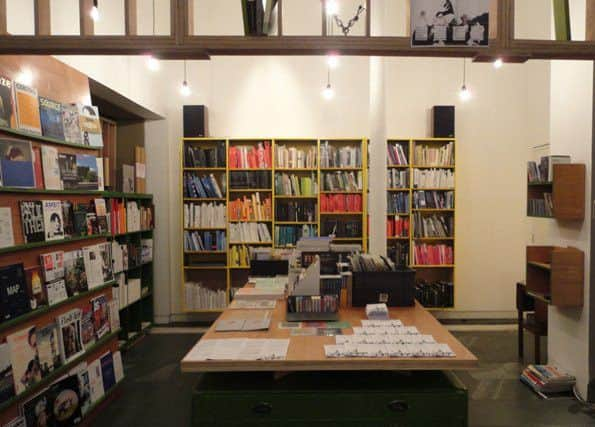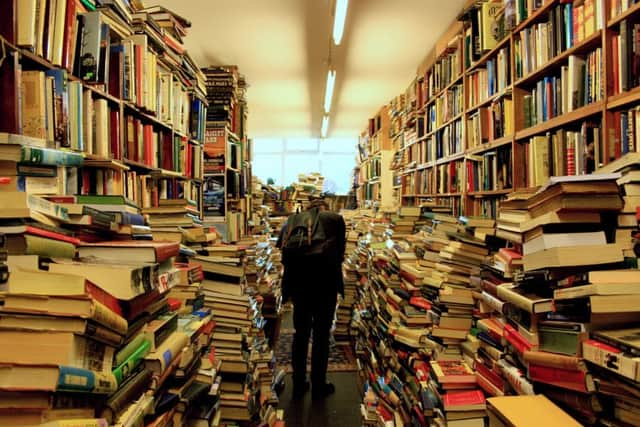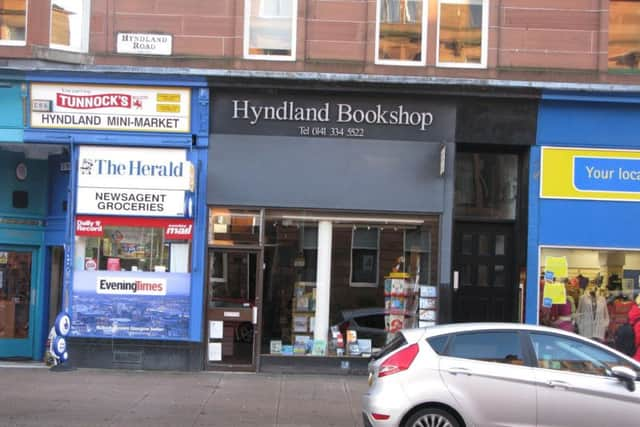Literary fighters: Glasgow's last surviving independent book shops


Located next to well-known coffee shops or hidden away down back streets and lanes, Glasgow’s small array of independent bookshops have become part as much part of the city as the Duke and his eye-catching cone hat. Most have been around long before our current cafe culture and many have seen the introduction and rise of the internet from their quiet haven of hardbacks. Students, one of the mainstays of literature in Glasgow, have seemingly changed their habits, buying trends for certain famous authors and genres have died out and dealers have completely changed thanks mainly to the global marketplace that sites such as Amazon have introduced.
But what these small, quirky shops offer is an experience – there’s a somewhat romantic notion of losing yourself browsing a bookshop, which is still prevalent today, possibly as a antidote for the fast-paced, instantaneous modern way of life that we all face. Also, each shop gives customers the opportunity to discover something new, find something old or pick up a unique gift for a special occasion. And each is staffed by knowledgeable, hard working staff and owners who not only know their trade, but have many a tale to tell about the world of literature.
Hyndland Books


143 Hyndland Road, G12 9JA, 0141 334 5522
Advertisement
Hide AdAdvertisement
Hide AdSet up by former librarians, David and Cathy Kinnear, Hyndland Books forms part of the street of local amenities for the nearby red and blonde stone tenement buildings. Neighbouring other independent gift, flower and food shops, Hyndland Books is Glasgow’s only new independent book store that has spent the last 20 years building up a dedicated clientèle of locals who not only buy books there, but have gotten to know David and Cathy.
“I’m changing the strings on her guitar,” laughs David in response to one of his regulars that has popped in. “It’s just another service.” It is this relationship with the neighbourhood that keeps Hyndland Books successful, not to mention their stock of interesting and not always well known books and gifts. “We don’t really have any particular popular genre” says David, “we are probably not big in mass market (books). There’s a lot of serendipity involved with what we stock and what people buy. It’s a little bit eclectic and quirky but we just mostly go with what customers want. It’s like any face to face/personal business. So the stock changes that way rather than reading best seller lists, which I probably haven’t done in about 25 years.”
David cites working with books, being his own boss and making his own decisions as the positives of owing an independent book shop but what about the challenges? “Well, the 4% rate increase in rent didn’t help” he laughs, “the overheads are high business-wise that’s probably one of the biggest challenges. And also advertising and marketing. Word of mouth is obviously the best way to advertise, especially the longer we are here, but it is quite difficult to know how to get the best bang for your buck out of our advertising and marketing budget.”


And as for the internet, David and Cathy have a positive outlook for the challenges it poses. “Well we have always been here with it (the internet), it was already big in 1997. We were aware of it in the early 90s, but by the time we opened here everyone knew about it, was talking about it and used it. In that sense we don’t see it as a challenge,well...we don’t do mail order and they don’t have shops” David laughs. “So it’s different, people come here for different reasons. If you know exactly what you want then online is fine but if you don’t know what you want then or you need some spark of inspiration then that’s why people come here. Often if a customer wants a gift for someone and they can’t think what to get, they come here and go away with something that’s far from what they thought they’d buy. You can always find something different here.”
And David’s predictions for the future? “Good, very good. There’s a lot of potential to grow. We still don’t do any promotional work such as author events but people still come in to the shop, they love it.” David explains “We need to be careful not to change too much as people like the shop as it is. If you’ve got a winning formula then why change? But on the other hand you can’t be too complacent.”
Caledonia Books
483 Great Western Road, G12 8HL, 0141 334 9663


Specialising in second hand, rare and antique books, Caledonia Books can be found on the West End’s bustling Great Western Road, in amongst coffee shops, cafes, and a newly opened pizza place. Opened 30 years ago, owner Charles McBride and his partner Maureen, had the chance to take on the shop lease and decided to “see what would happen”. Having gone from a double shop front, to what stands today, Charles has witnessed first hand the changes in the book buying and selling market.
“People still come in to buy and sell books but on a smaller scale. It’s a knock on effect as there’s fewer books that sell easily now and therefore there’s fewer people looking to buy books. There are large sections of the shop that did really well up until about 10 years ago – reference books, encyclopedias, dictionaries but by and large you can say that no-one is interested in those any more because if you want to know something these days you just go on to your phone and Google it. Google has become king of the world.” he says.
“There’s also certain genres that used to do well that don’t any more, such as history. Again people will get a lot of information from the internet instead of buying books.” explains Charles. He has also found that his customers and stock have changed significantly: “we used to get a lot of students, from when we opened until about 10 years ago. We used to go to the university before the term started, get all the reading lists and buy in copies of books that we knew would be on the lists. You’d have a real turnover – students selling us books at the end of term and others buying books at the start of the next term, the next year. But that has, to a large extent, died. It doesn’t happen any more. We still get quite a lot students but not as many and the subjects they buy are fewer. We can still sell literature and philosophy but there’s a lot of areas where they don’t buy books any more.”
Advertisement
Hide AdAdvertisement
Hide AdThe role that book dealers play has also changed since the advent of the internet. “Because you can sell books online now, dealers don’t travel so far. They can see what books you’ve got and you can see what books are being sold for all around the world. It’s become a global market. There’s a couple of dealers who used to come to us quite a lot and they do still occasionally come up from England. They used to come together and set aside 7-10 days for touring Scotland and visiting bookshops. The last time they were here was about a year ago, and the same tour now takes them three days as most of the shops have gone.”


As for Charles’s thoughts on the future? He is hopeful for a resurgence in books, as with records, and thinks that shops will always have their place, but he is realistic. “I see it diminishing, absolutely. I still think there will still be a place for shops. I am optimistic in the sense that we still get a lot of young people coming into the shop. I think there’s a place for certain books, unusual books. We can still sell certain thing quite well. For example we got a big collection two months ago of photography books – collections of famous photographers - and those sold immediately. We bought quite a good collection of relativity old 50/60s architecture books and it was hardly in the door before it was back out again. Therefore I think there will always be a niche thing but it’ll never be what it was, there’s no doubt about that. It’s just the way it is.”
Voltaire and Rousseau
12 Otago Lane, G12 8PB, 0141 339 1811
This second-hand shop has been part of the fabric of Glasgow’s West End for over 40 years. Situated in the tucked-away Otago Lane, Voltaire and Rousseau is an Aladdin’s Cave, well known locally for its rare finds which sit alongside new editions, atlases, vintage books, Penguin paperbacks and textbooks. With no order, books are stacked high and fill every available space so be prepared to spend time browsing and enjoying the sheer eclectic mix available at this treasure trove.
Owners, and brothers, Joe and Edmund McGonigle have seen the decline of once popular authors, the rise of ‘specialist’ internet pricing and outlived the digital popularity from their unique store, but have changed over time to offer props to film and TV and an online buying service.


“The shop has been in existence since 1972. For years we were talking about opening up a shop as we had a couple of houses full to the brim with books. We had been doing some kind of mail order at the time, then we eventually opened up the shop” says Edmund. Over the years the brothers have enjoyed the shop’s location thanks to the proximity to the University and nearby students plus the passing trade from tea shop, Tchai Ovna.
As with the other local bookshops, Edmund says: “Some books just don’t sell any more, for example, specialist books on trains. There’s not a new generation whoa re interested and buying these types of books. Also things like the Lonely Planet guides, they don’t sell any more as people can look online for what they need to know. Certain authors have also stopped selling as well, such as Morris Walsh. But classics such as Pride and Prejudice still do well.”
Edmund has found that the internet has changed everything and not just from a buying point of view. “We had this guy who was flogging a book around every shop in Glasgow. Online it was something like £400, but all the book sellers said in shops it would go for £40-45. The problem was someone had it on at £400 on a site so this guy was going round Glasgow and Edinburgh, probably costing him a fortune in travelling, trying to sell his copy of the book for that price. But we all agreed it was a figure that someone had just plucked out of nowhere. It (the internet) can skew expectations. You’ll have people saying that something is worth £60 as they have seen it online for that but we know that we can sell it for a fiver. Because we have been here so long, we know the prices. That’s a major thing that has come about since the popularity of the internet.” He continues: “we also get fewer students but the ones that do come in tell us that they wish they’d known about us first as our stock is much cheaper than Amazon.”
As for the future of one of Glasgow’s independent stores? Edmund isn’t sure that the shop can survived the next five years, although they have diversified. “We have set up online, it’s getting bigger and bigger all the time. The latest buyer was from China! The best sellers online are rare books or out of print books, which we have a lot of. We keep getting hires from TV – for props – such as specialist medical books. We have also supplied books to Outlander and River City, which is great. But Caledonia (Books) said to us they think they’ve only got about 5 years left and I think it could be the same for us. As people are constantly looking for books online, it’s hard to know how long we can last.”
Aye Aye Books
350 Sauchiehall Street, G2 3JD, 0141 352 4900
Advertisement
Hide AdAdvertisement
Hide AdPart of the Centre for Contemporary Arts, Aye Aye specialises in art books but also stocks a range of fiction, poetry, magazines, journals and exhibition catalogues. As Glasgow’s only specialist modern art bookshop, it offers an unparalleled selection of literature on Scottish art by and about artists.
Martin Vincent has been at the helm of Aye Aye Books, which started as a pop up shop within the CCA, but never left. “We set up nine years ago as a temporary shop but have just sort of stayed and become more embedded over the year” laughs Martin. “I enjoy running Aye Aye Books as I can choose what we sell. I haven’t run a bookshop before, or worked in retail and I am not very interested in retail, but I am interested in the content of the books which possibly means that we may struggle to make money as I am not choosing books based on what people might buy but on subjects that I think are interesting.”
This can lead to one of Martin’s challenges; people saying they wish they could afford to buy something! “The shop is like any small business these days, we rely on regulars, people coming a lot and spend a reasonable amount” he explains.
As one of the younger independent book stores, Martin set up Aye Aye Books when the internet was already huge, and he hasn’t seen much change. “I still think people like bookshops and like to come in, look at books and pick them up. Bookshops continue to exist so I guess there’s still a demand plus the kind of books we sell are very specialist.”
The future looks bright, if in need of a change, according to Martin: “I think a shop like ours needs to be incorporated into to some kind of bigger structure as it’s hard to survive as a very small business that just exists. It would be good to be part of something bigger. People love this shop but it’d be good to diversify things without turning it into something totally different.”
Despite dwindling numbers, the remaining shops have carved their niche, diversified and are still popular even though the market has dramatically changed over the years. As with the resurgence of vinyl over digital in the music scene, modern technology in the form of the Kindle hasn’t had a lasting or as great an impact on the overall sales and sentimental value put on books by consumers. It is this sentimental feeling plus the ability to find a gift, something unique, totally bonkers or a one-off (not to mention the bargain buys) in these stores that not only give them their charming character but will also see them fight another day.
